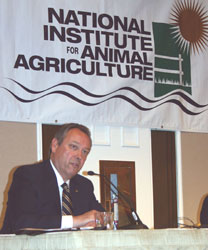 A reader alerted us to the impending opening of VALCO Bio Energy in Harlingen, Texas – the first plant to use cottonseed oil as a base stock for manufacturing biodiesel.
A reader alerted us to the impending opening of VALCO Bio Energy in Harlingen, Texas – the first plant to use cottonseed oil as a base stock for manufacturing biodiesel.
Valley Coop Oil Mill announced the project last fall and is expected to open the plant this spring.
Southeast Farm Press did a story earlier this year with Valco CEO Hollis Sullivan, who was at the Beltwide Cotton Conferences in New Orleans talking about the opportunities for biodiesel production to add value to cottonseed.
“An energy efficient plant is a goal,” said Sullivan. “We want to see what can be done. We can fill up trucks with bio-fuel when they bring in cotton. But we’re also looking for other opportunities. In 20 years, anyone who does not seize available opportunities will be left behind. We’re interested in adding anything that adds value to the crop.”
Sullivan said the Harlingen Co-op will be the first cottonseed mill with a bio-diesel plant. But he doesn’t expect it to be the only one. Anyone interested in following their lead, he said, “should do their homework. Study other bio-diesel plants and either build close to the raw material or make arrangements for a consistent supply.”


 Despite the support of Florida’s commissioner of agriculture for biofuels production, despite two recent ethanol history-making races held in the Sunshine State, and despite a new campaign that
Despite the support of Florida’s commissioner of agriculture for biofuels production, despite two recent ethanol history-making races held in the Sunshine State, and despite a new campaign that  The North Carolina General Assembly is considering a sweeping statewide strategic plan to strengthen North Carolina’s future in biofuels development and use.
The North Carolina General Assembly is considering a sweeping statewide strategic plan to strengthen North Carolina’s future in biofuels development and use. Biofuels and their impact on animal agriculture was the main topic at opening general session of the
Biofuels and their impact on animal agriculture was the main topic at opening general session of the  The keynote speaker was Bill Jones, chairman of
The keynote speaker was Bill Jones, chairman of 
 The plant is quite a boost to Keokuk as Tri-City Energy put its biodiesel plant in an old General Mills wheat processing plant that had been used just for storage for 30 years.
The plant is quite a boost to Keokuk as Tri-City Energy put its biodiesel plant in an old General Mills wheat processing plant that had been used just for storage for 30 years. A newly-completed study in Ontario shows that biodiesel could be an effective alternative fuel for farm operations in Canada. According to
A newly-completed study in Ontario shows that biodiesel could be an effective alternative fuel for farm operations in Canada. According to  “Our Government is committed to encouraging the development and use of renewable fuels,” said the Honourable Gary Lunn, Minister of Natural Resources. “Initiatives such as these play an important role in helping us achieve the government’s objective of five percent renewable content in transportation fuels by 2010. This is another example of how we can create new economic opportunities for farmers and the agricultural sector while also taking care of our environment.”
“Our Government is committed to encouraging the development and use of renewable fuels,” said the Honourable Gary Lunn, Minister of Natural Resources. “Initiatives such as these play an important role in helping us achieve the government’s objective of five percent renewable content in transportation fuels by 2010. This is another example of how we can create new economic opportunities for farmers and the agricultural sector while also taking care of our environment.” The
The  The
The